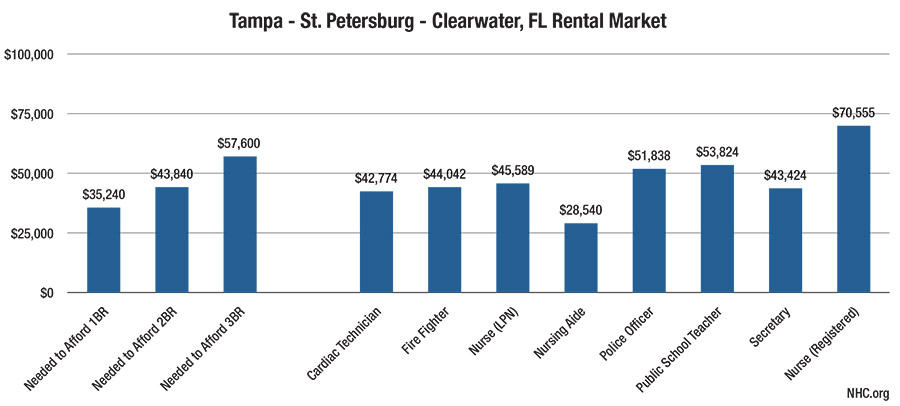Affordable Rental Housing Trends: Tampa-St. Petersburg-Clearwater MSA
The document titled “TPA 2017 RMS Fact Sheet” provides an overview of the Tenancy Protection Act (TPA) in Pakistan, detailing its objectives, key provisions, and implications for housing stability and tenant rights. The TPA aims to enhance the legal framework surrounding tenancy agreements and to protect the rights of tenants while also addressing issues related to housing affordability.
Introduction
The document provides a comprehensive overview of affordable rental housing trends in the Tampa-St. Petersburg-Clearwater Metropolitan Statistical Area (MSA) as of early 2025. The analysis highlights current market conditions, rental prices, and demographic shifts impacting housing affordability in the region.

Current Market Overview
As of February 2025, the Tampa-St. Petersburg-Clearwater MSA is experiencing a rental market that is slightly soft, with an overall vacancy rate estimated at 9.1%. This figure indicates a notable increase in vacancies compared to previous years, reflecting a shift in demand dynamics within the housing market2. The average rent across the MSA stands at approximately $1,650 per month, which is slightly above the national average of $1,5559.
Rental Price Variations
Rental prices in Tampa vary significantly by neighborhood. For instance, while the average rent is about $1,650, specific areas exhibit much higher costs. Downtown Tampa can see rents exceeding $2,700, whereas more affordable neighborhoods like Lowry Park and Sulphur Springs average around $1,481 per month1. The document outlines several neighborhoods where residents can find more budget-friendly options:
- Eastside Commercial: $1,965
- Palmetto Beach: $1,965
- Ballast Point: $1,965
- Bayside West: $1,965
- Fair Oaks – Manhattan Manor: $1,965
These neighborhoods represent some of the most affordable options within the city limits1.
Trends in Rental Housing Supply
From 2000 to 2015, the rental housing supply in the Tampa Bay area expanded by approximately 138,973 units. However, only about 45,014 units were deemed affordable for renters earning below 60% of the Area Median Income (AMI)3. This discrepancy highlights a critical issue: while the overall supply has increased, affordable housing options have not kept pace with demand.
Cost Burden Among Renters
The document reveals that a significant portion of low-income renters are “cost burdened,” meaning they spend more than 30% of their income on housing costs. In fact, most renters earning below 60% AMI face this burden due to rising rents and stagnant wages3. Conversely, higher-income renters are less likely to experience cost burdens.
Demographic Shifts
The region has seen an influx of new residents over recent years, contributing to increased competition for rental properties. Notably, between 2005 and 2015, there was a marked rise in low-income renter households—an increase of about 45,646 households—while higher-income households also grew significantly3. This demographic shift underscores the growing demand for affordable rental units amidst a backdrop of rising living costs.
Impact on Specific Populations
The document emphasizes that Florida’s aging population is particularly affected by the housing crisis. With nearly 13% of Tampa’s residents aged 65 or older, there is an urgent need for affordable housing tailored to seniors. Many elderly residents struggle to afford even what is classified as “affordable” rent due to increasing AMI levels over recent years5.
Recent Developments and Future Outlook
Despite a recent slowdown in rent increases—evidenced by a slight dip of 0.4% year-over-year—Tampa’s rental market remains relatively stable compared to other regions in Florida7. The construction of new apartment buildings is expected to help alleviate some pressure on rental prices as supply begins to catch up with demand.
Solutions to Address Housing Affordability
To combat Florida’s affordable housing crisis effectively, stakeholders are exploring various solutions such as:
- Joint public-private developments
- Mixed-income communities
- Land donations for affordable housing projects
These initiatives aim to create more sustainable and inclusive housing options for all income levels within the region5.
Conclusion
The Tampa-St. Petersburg-Clearwater MSA faces significant challenges regarding affordable rental housing. While there has been growth in rental supply since 2000, it has not sufficiently addressed the needs of low-income renters who continue to experience cost burdens. As demographic shifts continue and demand for affordable options rises—especially among seniors and low-income households—strategic interventions will be crucial to ensure equitable access to housing in this vibrant metropolitan area.
Further reading: Housing policy in the Republic of Korea
Cost-effectiveness analysis of a community paramedicine programme for low-income seniors living in subsidised housing: the community paramedicine at clinic programme (CP@clinic) – PMC
